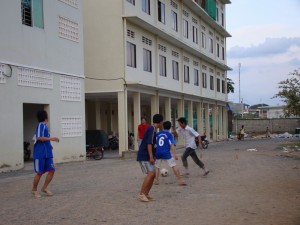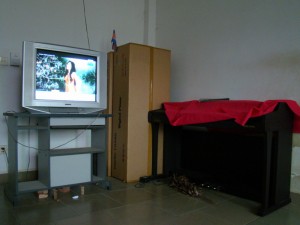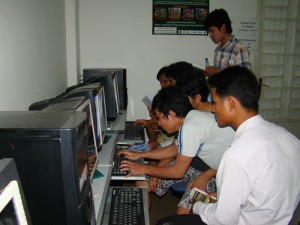
Cambodian Students who stay in dorm are playing football in front of their building in the evening / Photo by: Koam Tivea
You might want that noise to stop while you are studying or that light turned off when you are trying to sleep, but these are just the hassles you have to endure in a dormitory. Although living with a roommate in a dorm – and dealing with the unavoidable annoyances this entails – is a nearly universal experience for university students in many foreign countries, there is also a small group of Cambodian college kids living in close quarters at the Kingdom’s only state-run dormitory for university students.
After a few visits to the dorm, I decided that in order to get a true sense of dorm life, I needed to spend a night there myself. So last week I packed my bag and headed to the six-building dormitory campus on Russian Boulevard – neighbouring the Royal University of Phnom Penh – to get a taste of the parentless life.
In foreign countries, room and board (food and living accommodations), are usually part of tuition fees, but in Cambodia, dorms are free to some students from poor families and remote provinces and are reserved mostly for females (although my experience was mostly with young men for obvious reasons).

Cambodian Students who stay in dorm are playing football in front of their building in the evening / Photo by: Koam Tivea
Because of the noticeable lack of adults on the premises, you might expect security to be in short supply. But I felt at ease and well taken care of from the get go, and I witnessed a way of life that you’re not likely to see anywhere else.
The first lessons you are forced to learn are those of acceptance and cooperation. Many of us are used to having our own room and our own space to retreat to when we need some time alone, but you can say goodbye to these comforts as soon as you set down your bags.
San Kimleang, a 23-year-old woman from Kampong Thom province, said she used to be spoiled by her family, but has shed her sense of entitlement over the past three years. “We have to stay with our roommates for four years, so we need to find ways of living peacefully and it is critical to be tolerant of each other,” she said.
It’s easy to snap at siblings and take out your frustrations on family members, she explained, but while living with people outside her family, she often has to bite her tongue when she is angry or fed up with the behaviour of her dorm-mates.
Bou Sophal, who just moved into the dorm last year, knows all too well the challenges of communal living. “Sometimes people cause a disturbance, for example there will be a noise during when we want to study silently or our roommate needs light for studying while we are trying to fall asleep,” he said. “We have to be patient, tolerate and forgive. Today they unintentionally disturb us, but in the future we might do the same.”
While I could certainly understand their difficulties, having enjoyed my own quiet room for the past 20 years, I also saw how much the students cared for each other.
Hou Vanthy, 19, said he feels lucky to live in the dorm because his parents, who are farmers with six other children, have little money to spare. As he has become acclimated to Phnom Penh over the past year, he has been able to ask for help from the young men he lives with. “If I don’t have the documents I need, I can ask from them, and I talk with them about their experiences so that I can prepare myself for problems that lie ahead,” he said. “I have never lacked advisers while I’ve been living here.”
I was a bit jealous when I saw a computer room in the building. I have a laptop but, unlike the guys at the dorm, I do not have access to free computer lessons on a regular basis.
More senior members of the dorm, such as Suon Sampheavin, a 22-year-old student in his fifth year of civil engineering studies, said that design programmes like AutoCAD are crucial for engineers, but most students living at the dorm can’t afford the relatively expensive fees of a typical computer class. “I teach AutoCAD on weekends, using what I know, so the other guys don’t have to spend money on classes outside. If I don’t help them, they will face difficulties in the future,” he said.
I was happy to see that it wasn’t all work in the dorm. Barring rain, the self-sustaining students set aside some time in the evening to play football and badminton in the space outside of their dorm. Once they have worked up an appetite, they prepare dinner and, in the men’s dorm at least, pile in front of the TV to enjoy their food with the on-screen entertainment.
There is not a complete lack of adults – there is a health officer on site in case of an illness or emergency, and there is also not a complete lack of authority. Four buildings have adult managers, while two dorms have elected student managers to make sure things don’t get out of hand.
Ban Sam, who has been staying in the dorm since 2007, said that as the men’s manager he makes sure that students who enter the dorm follow the rules.
“Hanging around outside late is not allowed,” the 21-year-old said. “Gambling, drinking beer, or using drugs in the building is banned. For the safety of all students, bringing people from outside the dorm without asking for permission is not allowed,” he added, starting to sound like my parents.

This is a room in which Cambodia’s dorm-dwellers usually bring their meal to eat and enjoy watching TV together / Photo by: Koam Tivea
But just as I was thinking that dorm life signalled a release from chores, it only got worse. “Students have to live with cleanliness and hygiene; for example they have to clean their rooms and take turns cleaning the bathroom and toilet as it is used by everyone.” Ugh! The dorm really was starting to feel like home.
While the stories you hear about foreign dorms might sound more like anarchy than university, it seems that Cambodia’s dorm-dwellers are quite tame. While most of us have a family waiting for us when we finish our classes for the day, these students only have each other, and the way they support each other was nothing short of incredible. I was thankful for the openness and hospitality of my hosts, but happy to head home when I woke up in the morning.
by: Dara Saoyuth This article was published on Lift, Issue 36, September 15, 2010
